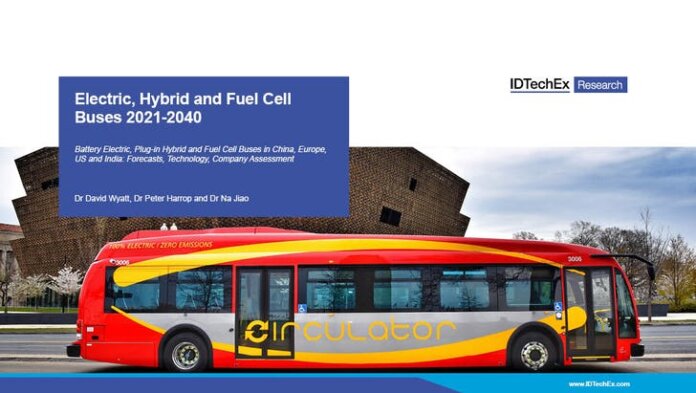The pressing need for cities around the world to improve air quality, alongside commitments by many governments to address climate change, are powering plans to deliver zero-emission city bus fleet solutions. Over the next decade, these efforts will see major cities increasingly refuse to purchase anything but zero-emission buses, as they deliver on promised zero-emission zones to protect the health of their citizens, according to a recent report by IDTechEx.
The new report, Electric, Hybrid and Fuel Cell Buses 2021-2040, offers an in-depth analysis of the evolving market, highlighting major developments over the past year, and presenting their outlook to 2040 for pure electric, plug-in hybrid and fuel cell buses.
Over this 20-year period, IDTechEx suggests uptake of zero-emission buses will primarily be of pure battery-electric models, with plug-in hybrid rapidly losing market share, and fuel cell electric buses taking only a small fraction of the market, as they fail to offer the same total cost of ownership benefit as battery-electric buses.
There remain significant cost barriers as well as uncertainty on how the necessary supply of cheap hydrogen will be produced to deliver fuel cell electric vehicles (FCEVs) promised environmental and economic credentials. According to the report, on a CO2 footprint basis, the use of grey hydrogen (hydrogen produced from fossil fuels with no CO2 capture), makes no sense. Currently, 96% of hydrogen produced is grey hydrogen.
Progress is being made on the development of FCEV buses; however, they are chasing a moving target. With falling battery pack prices, improving charging infrastructure and bus schedule/charging optimization for BEV, by the time sufficient hydrogen infrastructure is available to enable the widespread commercialization of FCEV buses, their deployment may be limited to long daily mileage applications.
The market is shifting rapidly, and several of the giants of the industry – who are still primarily promoting diesel buses – risk being left behind. The report examines how the bus is currently being reinvented and looks further into the future, to the rise of a new category: the autonomous shuttle.
For more information on this report, click here.






You mentioned grey hydrogen and pointed out how producing grey hydrogen ( hydrogen produced from fossil fuels) made no sense. That may be. Therefor it leaves the industry to focuses on the production of blue or green hydrogen.
Blue hydrogen is produced from electrolysis of water and green hydrogen is produced from bio related raw material such as bio-methane or other bio-mass
related material. These sources can provide all the hydrogen for transportation and other fuel cell connected energy production needed. This DOSE make sense!